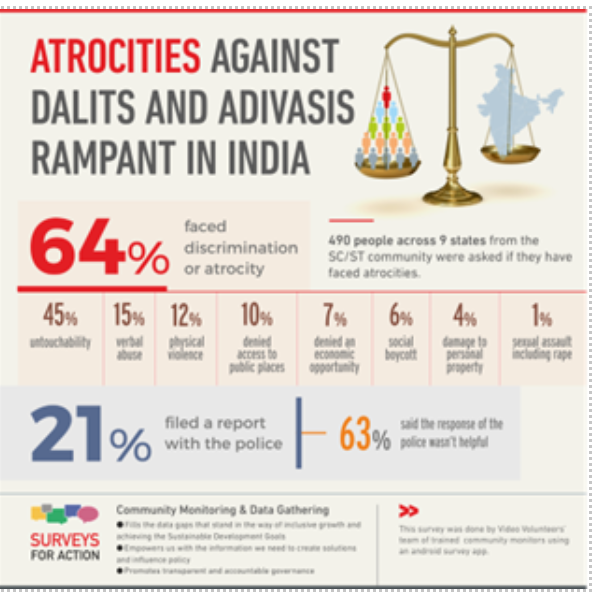
The elimination of caste-based discrimination is essential for the progress and evolution of a modern democracy. Caste-based inequalities have persisted for centuries, perpetuating social divisions and depriving millions of equal opportunities. In a democratic society, all individuals should be treated with dignity and equality, regardless of their caste or social background. Such discrimination not only violates the principles of justice and human rights but also hinders a nation’s ability to harness its full potential. To build a more inclusive and just society, it is imperative that a modern democracy actively addresses and eradicates caste-based discrimination in all its forms, ensuring that every citizen has an equal chance to thrive and contribute to the nation’s development.
Tags: GS Paper – 1: Diversity of India; Poverty and Developmental Issues.
GS Paper – 2: Welfare Schemes; Issues Relating to Development; Human Resource.
Exam View: Caste-Based Discrimination; Safeguards against Caste-based discrimination; Relevant data.

Context: Political dispensation has little impact on crime rates, highlighting the need for effective prosecution to combat caste crimes.
Contents
- 1 Decoding the editorial: Caste-Based Discrimination
- 2 Safeguards against Caste-based discrimination
- 3 Relevant data
- 4 FAQs on Caste has no Place in a Modern Democracy
- 4.1 FAQ 1: What is caste-based discrimination?
- 4.2 FAQ 2: Why is it important to eliminate caste-based discrimination in a modern democracy?
- 4.3 FAQ 3: How can a modern democracy work towards eradicating caste-based discrimination?
- 4.4 FAQ 4: Does eliminating caste-based discrimination mean ignoring cultural or historical aspects of caste identity?
- 4.5 FAQ 5: What benefits does a modern democracy gain by addressing caste-based discrimination?
- 5 In case you still have your doubts, contact us on 9811333901.
Decoding the editorial: Caste-Based Discrimination
- An enduring paradox of independent India has been crimes against Dalit communities.
- Despite the rising economic and political heft of caste-marginalized groups, violence against them spans the length and breadth of India.
- Regional specificities exist, as do differences in the strategies employed by various states to fight them.
- Any reboot of a national strategy to curb such cases will need to learn from these nuances.
Safeguards against Caste-based discrimination
- Constitutional Provisions:
- Article 15: The State shall not discriminate against any citizen on the basis of religion, race, caste, sex, place of birth or any of them.
- Article 16: No citizen shall be disqualified for any office under the State on the basis of religion, race, caste, sex, descent, place of birth or any of them.
- Article 335: Provides that the claims of the members of the SCs/STs shall be taken into account, along with the maintenance of efficiency of administration, in the making of appointments to services and posts in connection with the affairs of the Union or of a State.
- Article 330 and Article 332: Reservation of seats for SCs/STs in the Lok Sabha and State legislative assemblies.
- Constitutional Bodies:
- National Commission for Scheduled Castes.
- National Commission for Scheduled Tribes.
- Statutory Provision:
- Scheduled Castes and the Scheduled Tribes (Prevention of Atrocities) Amendment Act, 2018.
Relevant data
- Madhya Pradesh (MP) had the highest crime rate against people belonging to Scheduled Castes (SCs) in 2021.
- The state also had the highest crime rate against SCs in 2020 and was ranked second (behind Rajasthan) in 2019.

The rate at which charge sheets were filed was higher in MP than in most Indian states. Its neighbour, Rajasthan, was far lower on this aspect, highlighting that state police needed to do a lot more.
- The data holds two takeaways.
- When it comes to crimes against Dalits, the political dispensation in power appears to have little impact.
- MP was ruled by two different regimes in the past four years, but this appears to have had little impact on crime rates.
- There is no obvious correlation between administrations run by the BJP or the Congress, and a rise or dip in caste crimes.
- While states should strive to prevent such crimes, the least they can do is to effectively prosecute them (as MP has sought to).
Caste crimes are a result of impunity and deep prejudice. If social attitudes are sedimented, governments have a duty to spur change by effectively prosecuting such crimes, underlining that in a democracy, caste bias has no space.

FAQs on Caste has no Place in a Modern Democracy
FAQ 1: What is caste-based discrimination?
Answer: Caste-based discrimination refers to the unjust treatment or differentiation of individuals based on their caste or social background. It encompasses practices that deny people opportunities, rights, and privileges solely due to their caste, which is deeply ingrained in some societies.
FAQ 2: Why is it important to eliminate caste-based discrimination in a modern democracy?
Answer: Eliminating caste-based discrimination is vital in a modern democracy because it upholds the principles of equality, justice, and human rights. In a democracy, every citizen should have equal opportunities and be treated without prejudice, regardless of their caste, to ensure a fair and just society.
FAQ 3: How can a modern democracy work towards eradicating caste-based discrimination?
Answer: A modern democracy can address caste-based discrimination through legal reforms, public awareness campaigns, and policies that promote social equality. This may include affirmative action programs, educational initiatives, and strict anti-discrimination laws to ensure that all citizens are treated equally.
FAQ 4: Does eliminating caste-based discrimination mean ignoring cultural or historical aspects of caste identity?
Answer: No, eliminating caste-based discrimination does not mean erasing cultural or historical aspects of caste identity. It means ending discrimination and ensuring that every individual, regardless of their caste, has equal access to opportunities, rights, and privileges, while preserving and celebrating cultural diversity.
FAQ 5: What benefits does a modern democracy gain by addressing caste-based discrimination?
Answer: By addressing caste-based discrimination, a modern democracy benefits from a more inclusive and harmonious society. It unlocks the full potential of all its citizens, leading to economic and social progress. It also strengthens the nation’s social fabric by fostering unity and reducing divisions based on caste, contributing to a more stable and equitable democracy.
In case you still have your doubts, contact us on 9811333901.
For UPSC Prelims Resources, Click here
For Daily Updates and Study Material:
Join our Telegram Channel – Edukemy for IAS
- 1. Learn through Videos – here
- 2. Be Exam Ready by Practicing Daily MCQs – here
- 3. Daily Newsletter – Get all your Current Affairs Covered – here
- 4. Mains Answer Writing Practice – here

